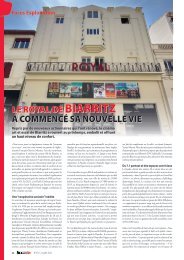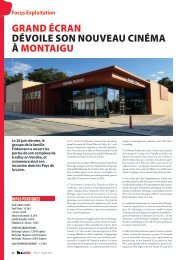You also want an ePaper? Increase the reach of your titles
YUMPU automatically turns print PDFs into web optimized ePapers that Google loves.
: March<br />
BACKGROUND<br />
TO SETTLEMENT<br />
THE<br />
tax was imposed suddenly Aug. 7,<br />
of the blow w-hen it fell.<br />
Under the terms of the Britisli edict ;in<br />
estimate of profits on each film was to be<br />
made as the film arrived in port and thi.'^<br />
money was to be paid in advance, with a<br />
refund if the film failed to come up to estimates.<br />
American distributors quickly estimated<br />
that this would tie up about $25,000,-<br />
000 without interest and that the reniaining<br />
25 per cent of profits would be completely<br />
eaten up by the costs of distribution.<br />
It was the first time any such drastic attack<br />
on an American export had been made<br />
outside the Russian sphere of influence. Some<br />
speculated that it was a deliberate attempt<br />
to bar all American films from the British<br />
market.<br />
Apparently it was as much of a surprise to<br />
J. Ai-thur Rank as it was to film men in the<br />
U.S. He inmiediately promised a sharp increase<br />
in British production to make up for<br />
the prospective famine of films, but as of<br />
Febniai-y 28 he had succeeded in adding only<br />
two pictures to his proposed schedule of 38<br />
and all the British studios controlled by<br />
Americans were idle.<br />
Also on that date there were 17 American<br />
pictm-es left for release in England. All these<br />
had been imported before the ban went into<br />
effect. Ten of them were not top grade<br />
product.<br />
n CTUAL cash losses of American firms from<br />
August 8 to the first week in March were<br />
not large. Remittances were continued on<br />
films which reached England prior to the<br />
tax date and the total of payments for November.<br />
December and January ran up to<br />
about $12,000,000. a normal sum for a threemonth<br />
period. This money came out of the<br />
$3,000,000,000 U.S. loan upon which Great<br />
Britain was drawing.<br />
The exhaustion of this loan and the prospective<br />
start of the Marshall plan seemed<br />
to be coincidental.<br />
Indirect effects of the tax were widespread.<br />
Several other European countries took theiicue<br />
from the British action and began to devise<br />
restrictions of their owm, all based on<br />
the explanation that they lacked dollar exchange.<br />
The impression gained ground in<br />
this country that this was part of a general<br />
worldwide move to hurry the Marshall plan<br />
into operation.<br />
In England theatre business fell off as new<br />
films failed to arrive. Production slipped.<br />
Even J. Arthur Rank found it difficult to<br />
get loans for production that obviously was<br />
not going to get a warm reception over here<br />
so long as the British exclusion continued.<br />
He began reorganizing his complicated holdings<br />
and induced the Odeon circiut to buy<br />
his Cinema Finance Corp., a holding company.<br />
In this comitry major producers went into<br />
a panic much like the one which swept the<br />
industry at the outbreak of World War II<br />
Rank Is Here: He Believes<br />
Settlement to Benefit All<br />
1947. and shipment of American films<br />
to Europe was stopped by the Motion<br />
Picture Export Ass'n the following day.<br />
For some weeks before the tax was imposed NEW YORK— J. Arthur Rank predicts<br />
had been campaign<br />
stated, was to secure more playing time for<br />
there a in the British<br />
press against American films, and the slogan<br />
that the settlement of the British tax problem<br />
and resumption of<br />
British pictures here. He said there had been<br />
a substantial Increase in bookings of British<br />
of "food or films" was presented to the<br />
film exports from this pictures and the number of imports had increased<br />
British people by Sir Stafford Crrpps. but<br />
country will benefit<br />
from five in 1945 to 11 in 1946 and<br />
this did not prepare either the British or<br />
the industries of both<br />
the American industry for the drastic nature<br />
20 in 1947.<br />
countries.<br />
The increase was steady, he said, and he<br />
"I felt from the beginning,"<br />
intended to "have patience."<br />
he s a i d,<br />
Rank discussed the financial position of<br />
BOXOFFICE :<br />
13, 1948<br />
"that if<br />
the leaders of<br />
the American industry<br />
would go to London<br />
and sit down around<br />
a table that something<br />
satisfactory could be<br />
worked out. I am a<br />
J. Arthur Rank great believer in this<br />
method of doing business,"<br />
Rank's comments were made at a press<br />
interview Thursday morning (11) in the<br />
Sherry-Netherland hotel. He reached New<br />
York the evening before on the Queen Elizabeth.<br />
A daily newspaper correspondent read a<br />
flash bulletin from London to him announcing<br />
that an agreement had been reached.<br />
He professed surprise, although it was known<br />
at the time that a meeting of foreign department<br />
heads and company presidents had<br />
been held the previous night at the MPAA<br />
for discussion of the terms of settlement, and<br />
that the details had been telephoned to company<br />
presidents in Florida and Hollywood<br />
who were unable to be present.<br />
Rank said frankly that there had not been<br />
"a spectacular increase in production in<br />
Great Britain in anticipation of a film<br />
shortage." He had increased his own production<br />
from 38 to 40 and some other producers<br />
had expansion plans, he said.<br />
There had been no actual shortage of<br />
American films, he said, up to the time of<br />
settlement, and the public had not shown<br />
much interest in the problem.<br />
Like the American companies, Rank said,<br />
British producers had cut production costs<br />
about 15 per cent in anticipation of revenue<br />
One of the objects of his current trip, he<br />
when everybody feared the complete loss of<br />
the foreign market.<br />
Wholesale economies were instituted in both<br />
production and distribution departments.<br />
The number of employes let out ran into<br />
the thousands. Eric Johnston has said that<br />
it was at first decided to impose top budgets<br />
of $500,000 on pictures, but that later the<br />
producers raised this to $1,000,000, so that<br />
product would not obviously deteriorate.<br />
Some of the major companies have indicated<br />
in their amiual reports that they had<br />
cut overhead to the point where they expected<br />
to be able to get along without the<br />
his companies in Great Britain. He said the<br />
growth had been too .speedy and that his corporate<br />
structure was now being simplified.<br />
None of the individual companies have lost<br />
money he said, and one of the purposes of<br />
his current visit is to discuss with Spyros P.<br />
Skouras, 20th Century Pox president, the<br />
simplification of the 20th-Fox share of<br />
Gaumont British Theatres. Twentieth-Fox<br />
owns 47 per cent of Gaumont British through<br />
a<br />
holding company. Metropolis and Bradford<br />
Ti-ust.<br />
At present American newsreels are in a<br />
state of agitation over the fact that Rank<br />
has received exclu.sive rights to photograph<br />
the Olympic games in England next summer.<br />
He said that he would discuss this with the<br />
American newsreel companies and try to work<br />
out a satisfactory arrangement. He, like<br />
others, had been offered the exclusive rights<br />
at a price. He accepted the offer, he said, because<br />
one of his companies intends to make<br />
a feature next fall Including Olympic footage.<br />
Whatever footage is included in the feature<br />
he wants exclusively.<br />
His plans for use of television in .some of<br />
his British theatres, he said, were still indefinite<br />
because the British Broadcastmg<br />
system to date has granted him only experimental<br />
licenses and these do not permit<br />
showings before paid audiences. He hopes<br />
to get this permission. If he does, he said,<br />
he will put television into two theatres.<br />
In reply to a question he said that in England,<br />
at least, he did not feel television would<br />
be theatre competition, because sporting<br />
events which he wants for theatres take<br />
place afternoons when theatres need a boxoffice<br />
stimulus.<br />
British income.<br />
In recent weeks it had become apparent<br />
that Great Britain and other European countries<br />
had begun to realize that this country<br />
was not going to toss Marshall plan fmids<br />
aroimd like Lend-Lease and UNRRA, but intended<br />
to use them where they would benefit<br />
business in this country as well as In the<br />
countries receiving them.<br />
The State department took this stand some<br />
time ago and all the congressional discussion<br />
has indicated that there will be strings<br />
on the spending.<br />
About the same time that the British leaders<br />
indicated they were in the mood for<br />
further discussion of the tax, Denmark decided<br />
to peiTnit the entry of 81 films from<br />
this country in the next ten months.<br />
Toward the end of February Mexico began<br />
talking about imiwsition of an ad valorem<br />
tax on American films. The MPEA immediately<br />
asked for .state department intervention.<br />
It thus became apparent that the state<br />
department had decided to go into foreign<br />
restrictions in a realistic way.

















